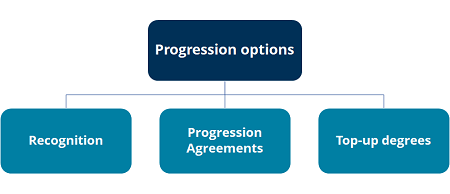Degree Finder: key terminology for students
The Degree Finder (DF) platform allows you to search for available progression pathways towards achieving a degree after successfully completing a BTEC Higher National (HN) qualification. We work with Higher Education Institutions (HEIs) across the globe to raise awareness and recognition of HNs as a suitable means of entry onto a degree.
Frequently Asked Questions
What types of progression options are available?

Recognition
Definition: The institution or university recognises HNs generally but you will need to apply to see if they accept your specific HN.
Context:
- We have a wide range of institutions across the globe that have informed us that they accept HNs during the application process. These institutions assess students with HN qualifications on an individual basis.
- If you are thinking of applying to one of our recognition institutions, we recommend that you reach out to them or submit an application so they can review your transcript. You can view a full list of these institutions on our map.
Progression/Articulation Agreements
Definition: The institution or university provides guidance on which HN pathways align to which degree programme.
Context:
- We work with institutions to provide thorough guidelines for students in recommending degree programmes that align to specific HN pathways. This enables you to submit your application with greater confidence.
- Progression agreements may also come in the form of a credit transfer when considering international destinations such as Australia, Canada and the USA.
Top-up degrees
Definition: The institution or university has specifically designed programmes for HN graduates to 'top-up' to an undergraduate degree.
Context:
- These are programmes specifically designed by universities for students studying qualifications at HN level, who would like to complete an undergraduate degree. You will see the term “top-up” mentioned in the title of the course. The duration of a top-up degree is typically one year (with full-time study), although we do have some two year top-ups on the site.
- For example: if you complete a HND in Engineering, your search results may include top-up programmes such as BEng Applied Mechanical Engineering (Top-up), enabling you to study an extra year after your HN and gain a degree.
________________________________________________________________________________________________________________________
What do the results show?
Progression pathways
- The search results show the possible progression routes to specific degrees and institutions, based on the search criteria that you enter. Each search result will also provide a link to all of our recognition institutions.
Mode of study
- The results will indicate if a course is available as online or blended learning. this will appear under the degree name, where applicable.
- You can also search for online or blended learning options only.
Entry requirements
- Please check the listed pathways for the available advanced credit or year of entry you would be entitled to. This may vary between different destinations, institutions and even the grade you achieve in some destinations.
As an example:
HNDBusiness (RQF)MarketingBA Marketing Hons, University of ABCEntry to Year 3. Merit grade required in Higher National qualification.
________________________________________________________________________________________________________________________
Am I guaranteed a place?
- No, Pearson cannot guarantee that you will be accepted. The decision on your application remains at the discretion of the institution you are applying to.
- We strongly recommend that if you are considering applying, you should reach out to the institution’s admissions, recruitment or international department (where applicable) for additional support during the application process.
________________________________________________________________________________________________________________________
Is there anything else I should consider?
Entry requirements
- You will need to confirm English language requirements with the institution. You can usually find this on the institution website.
Advanced Credit
- HNC and HND carry university level credit. When applying with HND In the UK you may typically experience a two-plus-one offering, meaning that a university will allow you to enter onto the final year (level six) of a bachelors degree (or first-year of a top-up programme).
It is worth clarifying how much credit the institution will offer you upon having your credentials assessed by their admissions team, as this can vary between countries and institutions.
Post-study visa eligibility
- If you are planning to complete your degree abroad and continue to work after graduation, we highly recommend that you check post-study work visa requirements in the country of your choice.
- For example: if you are seeking progression to an Australian institution, you will need to check the amount of credit they offer to you, to ensure this does not affect your eligibility criteria for a post-study work visa when graduating.
Costs
- We also recommend that you consider the financial commitments of completing a degree. As well as the course fees, you should take into consideration the accommodation and living costs.
______________________________________________________________________________________________________________________
The entry requirements mention HND but not HNC, am I still eligible?
- We recommend that you apply, as a vast amount of universities accept HNC for entry into the second year of degree study.
________________________________________________________________________________________________________________________
If you have any feedback, or need any assistance in using the Degree Finder, do not hesitate to get in touch at progression@pearson.com.


